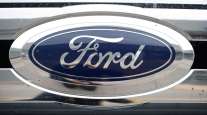Ford Fesses Up on Emissions Early in Effort to Limit the Damage

Ford Motor Co. revealed its emission testing could be flawed and took pains to soothe anxiety among investors in an industry wracked by years of pollution scandals.
Ford said workers raised concerns about its testing in September, and the automaker since has hired an outside firm to help conduct an investigation that could stretch into the summer. Along with the unidentified firm and regulators, the company will look into how it has used road-load specifications to simulate how aerodynamic drag and tire friction can affect fuel economy outside testing labs.
By speaking up Feb. 21, even before sorting out just how big a dilemma it faces, Ford managed to keep shareholders relatively calm. An initial stock swoon after the disclosure gave way to a tempered drop. The U.S. Environmental Protection Agency also signaled it is pleased the company stepped forward voluntarily.
The mea culpa was a far cry from Volkswagen AG’s handling of its so-called dieselgate scandal, which has haunted the German giant for years and cost it upward of $32 billion. Whereas VW’s diesel engines were deliberately designed to skirt emissions rules, it is too early to say whether Ford intentionally was gaming the system. Ford also is coming forward, while VW stonewalled environmental regulators for months.

“It seems as if Ford is trying to nip this in the bud,” said Michelle Krebs, senior analyst for car-shopping research er Autotrader. “It wasn’t brought to Ford’s attention by outsiders or consumers; it was discovered by employees and, to their credit, they listened to them.”
Touchy Subject
Ford said it hasn’t yet found that any of its fuel-economy ratings are inaccurate. Although the company is evaluating potential changes to its road-load modeling process, it is distancing itself from VW. The Dearborn, Mich.-based carmaker said its concerns don’t involve so-called defeat devices used to cheat emission tests.
“Everyone treats the subject of emissions testing very delicately because of what happened at VW,” said Jessica Caldwell, executive director of auto industry analysis at researcher Edmunds.
While Ford shares fell as much as 3.3% after its disclosure, they were down 0.2% later in trading after the market close.
Months after its employees raised concerns, @Ford finally admitted there may be problems with its emissions testing.
Once again, the auto industry proves it can't be trusted to act in the public’s interest. We need laws to hold the industry accountable.https://t.co/2FjEmG3umC — Public Citizen (@Public_Citizen) February 22, 2019
“It has been a long and deep discovery process,” said Kim Pittel, Ford’s group vice president of sustainability, environment and safety engineering. “At this time, there’s been no determination that we have an issue with our fuel-economy labels or our emissions certification. It’s too early in the investigation to say that.”
Regulator Reaction
EPA said Ford informed the agency Feb. 18 and briefed the regulator on its initial findings the following day.
“The investigation is ongoing, and the information too incomplete for EPA to reach any conclusions,” agency spokesman Michael Abboud said by e-mail. “We take the potential issues seriously and are following up with the company to fully understand the circumstances behind this disclosure.”
EPA intends to determine whether the discrepancies Ford discovered were widespread or isolated, an agency official briefed on the matter said. The regulator is taking the matter seriously, and Ford’s voluntary disclosure was seen as positive, the official said.
Ford announced it is hiring an outside firm to conduct an investigation into its internal process for complying with U.S. fuel economy and emissions standards. - @CNBC https://t.co/ZpP06fRSzx — NBC News (@NBCNews) February 22, 2019
The California Air Resources Board, which played a major role in unearthing VW’s scandal, had no immediate comment. Spokesman David Clegern said the regulator hadn’t heard from Ford as of Feb. 21, contradicting the company’s statement that it shared its concerns with the regulator this week.
Trump-Versus-California
Environmental and consumer-advocacy groups were quick to condemn Ford, which made its announcement the same day the White House said it was cutting off talks with California over future fuel-economy standards.
Ford was among the carmakers that asked President Donald Trump to reopen a review of rules set by the Obama administration, which helped set in motion an escalating series of policy clashes between Washington and Sacramento.
The automaker has had fuel-economy issues before. It restated ratings on six models, including the Fiesta, C-Max and Fusion hybrid cars, in 2014 and cut checks for as much as $1,050 to more than 200,000 owners to compensate for their vehicles’ mileage shortcomings.
Now, the first model Ford is evaluating as part of its certification-process review is the 2019 Ranger pickup.
“I’m not too worried about it for now, at least,” Morningstar Inc. analyst David Whiston said. “For investors, I don’t think there’s anything to do at this point. You just have to stay tuned for more information.”




